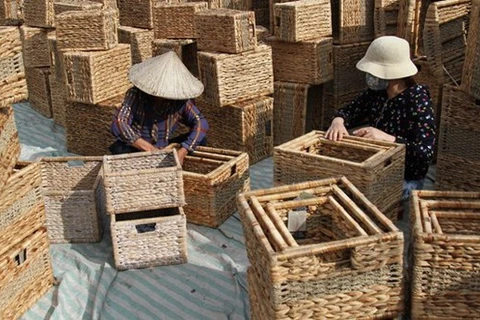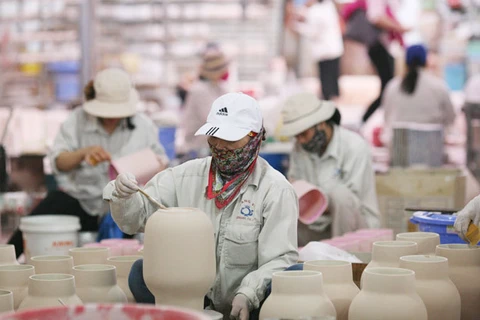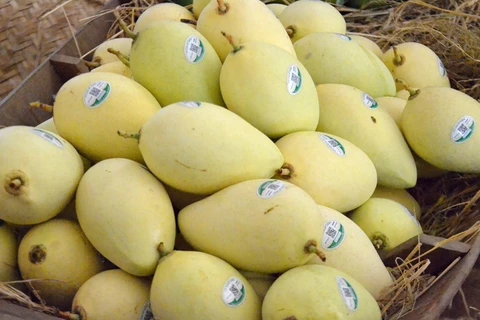 Ben Tre Province’s OCOP products are displayed in a booth in Tu Sơn Supermarket in An Giang Province’s Chau Doc City. (Photo: VNA/VNS)
Ben Tre Province’s OCOP products are displayed in a booth in Tu Sơn Supermarket in An Giang Province’s Chau Doc City. (Photo: VNA/VNS) Under the programme begun three years ago, OCOP products are commercial products and services, including food, beverages, handicrafts and rural tourism services. OCOP products are classified under a five-star system.
In Can Tho, the municipal People’s Committee recognised 21 OCOP products in 2021.
Le Van Tinh, deputy head of the city’s Coordination Office for New-style Rural Area Building Programme, said the city had recognised 41 OCOP products so far.
They include 21 four-star OCOP products and 16 three–star ones. The products belong to production establishments, households, cooperatives and companies.
The OCOP products include fish paste products of Pham Nghia Food Company, Rong Vang purple rice of Duy Duc Hung Company, two tea products – one from red bean and brown rice and another made from five kinds of bean – of Thuan Hoa Production Establishment.
The delta’s provinces have recognised many OCOP products in 2021 and aim to develop more OCOP products.
Ca Mau province recognised 18 OCOP products in 2021. They are three kinds of fish sauce products, Tu Tam biological rice, Minh Duy fermented bulrush, Minh Quan dried soft banana, crocodile leather men’s shoes, crocodile leather men’s purses, and crocodile leather waist belts and other products.
The province has a total of 51 OCOP products, ranging from two to three-star levels.
The delta, which is the country’s largest rice, fruit and seafood producer, has 375 OCOP products, accounting for 17.3 per cent of the country’s total OCOP products.
The OCOP product programme has helped the delta’s provinces and Can Tho to enhance the competitiveness of their products and increase income for the producers, according to local authorities.
The delta has many OCOP products with high quality, but their sales still face difficulties because of the lack of linkages among OCOP product producers and sellers, and the lack of promotion activities for the OCOP products.
According to Le Trung Hieu, Director of An Giang province’s Investment and Trade Promotion Centre, most OCOP products are made in villages by farmers and they do not have high awareness about promoting and marketing their products.
In addition, many localities have not paid proper attention to promoting OCOP products.
The impact of the COVID-19 pandemic has also affected trade promotion activities of OCOP products.
To help OCOP producers promote the sale of their products, local authorities in the delta have supported them to design packages and labels for OCOP products.
Pham Thanh Hai, Deputy Director of Bac Lieu province’s Department of Agriculture and Rural Development, said many agricultural products and products of handicraft villages had been developed into OCOP products, contributing to economic efficiency and income for people.
However, the programme has not met the province’s potential and advantages since some localities do not pay proper attention to the programme, according to Hải.
Many households, co-operatives and companies are reluctant to participate because they are afraid of spending too much time on procedures needed to recognise OCOP products.
The province will boost advocacy activities to enhance the awareness of local authorities about the programme, improve the quality of evaluating OCOP products, and reform administrative procedures on recognising them.
Promotions
To boost the sales of OCOP products, the delta’s provinces and Can Tho city are strengthening trade promotion activities for the products via showrooms, trade fairs and exhibitions.
They have promoted the registering of OCOP products for sale on e-commerce platforms and linked up with supermarkets to sell the products.
An Giang province has linked up with Co.opmart, Bach Hoa Xanh and other supermarkets to sell OCOP products.
The province in cooperation with the delta’s Dong Thap and Ben Tre provinces and Can Tho has developed a system for showcasing OCOP products of the four localities.
An Giang plans to establish a OCOP product site in combination with offering tourism services in 2022.
It also plans to choose one or two OCOP products to promote abroad and export in 2022.
Nguyen Si Lam, Director of An Giang province’s Department of Agriculture and Rural Development, said: “The OCOP product programme is one of the most important solutions for restructuring agricultural production and rural areas in combination with the province’s inner strengths, natural conditions and local cultures.”
"It has contributed an important role in implementing the National Target Programme on Building New-Style Rural Area," he said./.
VNA
























